|

by John Summerly
January 14, 2015
from
PreventDisease Website
|
John Summerly is
nutritionist, herbologist, and homeopathic practitioner.
He is a leader in the natural health community and
consults athletes, executives and most of all parents of
children on the benefits of complementary therapies for
health and prevention. |
As air quality levels continue to degrade between environmental
pollution, chemical pollution and geoengineering - lung disease,
infections and illness continue to rise.
Herbal remedies not only boost lung
health, but they can heal infections which cause the most common
coughs.

A typical cough starts with a deep breath, followed by a compression
of air in the lungs and then a crackling burst as that air is forced
out in a fraction of a second.
1) CHRONIC DRY
COUGH
A stubborn dry cough that comes and goes, but never quite
disappears.
A chronic cough is not a disease in
itself. It is a sign of something wrong with the breathing system.
It's called a dry cough because it doesn't produce phlegm. It
usually occurs during the day, prompting a coughing fit that can
last three to ten minutes.
In extreme cases, sufferers experience
soled muscles, incontinence and even fractured ribs.
CAUSE
Such coughs used to be simply written
off as 'unexplained'.
But doctors have recently discovered
that in some cases the problem is hypersensitivity in the
upper-airways, triggered by a reflux of gas from the stomach. Dry
coughs are usually caused by allergies, colds and bronchitis.
Certain medications can cause coughing, particularly ACE inhibitors,
prescribed for high blood pressure. This -usually happens in about
15 percent of people who use them - possibly because the drugs stop
the breakdown of a naturally-occurring chemical called bradykinin
which, in turn, makes the nerve endings in the lungs more sensitive
to irritation.
Once this hypersensitivity has set in, sufferers will have a
coughing fit if anything - such as dust or cold air - touches their
throat. However, not everyone who has gas reflux will develop a
cough as a symptom.
A chemical found in cocoa and chocolate appears to suppress coughs
and could potentially be developed into an effective treatment,
according to the results of a small new study.
Counteracting Herbs
PLANTAIN LEAF
Plantain leaf is exceptional for dry
coughs as it promotes spawning mucus production in the lungs.
any of its active constituents show antibacterial and
antimicrobial properties, as well as being anti-inflammatory and
antitoxic.
EUCALYPTUS
Eucalyptus is a common ingredient in cough lozenges and syrups
and its effectiveness is due to a compound called cineole.
Cineole has numerous benefits - it's an expectorant and can ease
dry coughs while soothing irritated sinus passages.
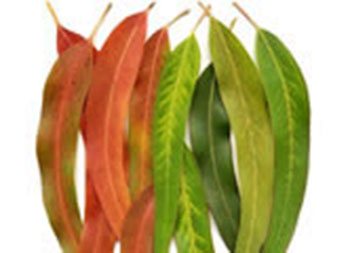
As an added bonus, because
eucalyptus contains antioxidants, it supports the immune system
during a cold or other illness.
PEPPERMINT
One of the problems with chronic dry coughs is the tightening of
smooth muscles.
Peppermint, and peppermint oil,
contains menthol - a soothing ingredient known to relax the
smooth muscles of the respiratory tract and promote free
breathing. Many people use therapeutic chest balms and other
inhalants that contain menthol to ease dry coughs.

The juice from fresh pineapples is also known to suppress coughs
of this type five times more effectively than cough syrup.
2) CHESTY
COUGH
This brings up lots of phlegm - and there can be wheezing, chest
tightness and some difficulty breathing. Chesty coughs are triggered
by an excessive amount of mucus in the chest. For this reason, they
are sometimes referred to as mucous coughs.
It's often worse in the mornings and the -winter, as it's
exacerbated by viruses that affect the lungs.
CAUSE
Cold and flu viruses and these
infections are the most common cause of chesty mucous coughs.
Other lung infections are a wide variety
of other infections, ranging from pneumonia to TB (tuberculosis),
can give rise to a chesty cough. Chronic Obstructive Pulmonary
Disease (COPD) - the collective name for lung conditions, such as
chronic bronchitis and emphysema. COPD is commonly caused by smoking
and usually produces chesty coughs.
The important thing is to notice symptoms that haven't happened
before, such as this chesty cough or breathlessness.
Counteracting Herbs
CHAPARRAL
Chaparral contains powerful antioxidants that resist irritation.

It is also an herb that fights
harmful organisms common in chesty coughs. The benefits of
chaparral are most available in a tincture extraction but
chaparral tea may support respiratory problems by encouraging an
expectorant action to clear airways of mucus.
SAGE
Sage's textured leaves give off a heady aroma, which arises from
sage's essential oils.
These oils are the source of the
many benefits of sage tea for lung problems and common
respiratory ailments.
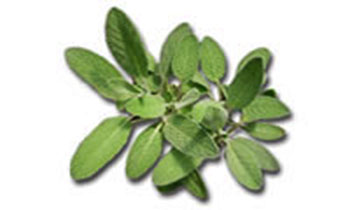
Sage tea is a traditional treatment
for sore throats and chest coughs. The rich aromatic properties
arising from sage's volatile oils of thujone, camphor, terpene
and salvene can be put to use by inhaling sage tea's vapors to
dispel lung disorders and sinusitis.
Alternatively, brew a strong pot of
sage tea and place it into a bowl or a vaporizer.
TURMERIC
Medicinal value of turmeric is due to the compound curcumin.
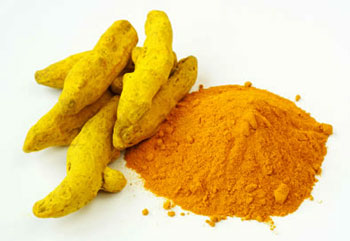
There are three different
curcuminoids present in turmeric they are,
-
diferuloylmethane
-
demethoxycurcumin
-
bisdemethoxycurcumin
Of the three diferuloylmethane is
present in higher amounts and is responsible for the color and
medicinal value of the herb.
Curcumin serves as an
anti-inflammatory agent and also possess anti-bacterial and
anti-viral action.
These properties of turmeric aid in
treatment of bacterial and viral infections involved in chest
coughs. Use of volatile oil extracted from turmeric for cough is
also very promising in relieving cough by getting rid of phlegm.
3) THROAT -
CLEARING COUGH
It feels like you have a lump in your throat and coughing leaves you
with a nasty, bitter taste in the mouth. The cough can be triggered
by talking, laughing, singing or eating particularly dry food. It
also tends to occur at night.
CAUSE
The most likely cause is stomach acid
reflux - this affects about 25 percent of the adult Western
population. As the lining of the esophagus is extremely soft and
sensitive, this leads to inflammation, which triggers a coughing
fit.
Reflux can lead to a condition called Barrett's esophagus - this
causes abnormalities in the cells and raises the risk of oesophageal
cancer.
Counteracting Herbs
SLIPPERY ELM
Slippery elm contains mucilage, a
substance that becomes a slick gel when mixed with water. It
coats and soothes the mouth, throat, stomach, and intestines. It
also contains antioxidants that help relieve inflammatory
coughs.
Slippery elm also causes reflux
stimulation of nerve endings in the gastrointestinal tract
leading to increased mucus secretion.
LUNGWORT
A tree-growing lichen, lungwort actually resembles lung tissue
in appearance.
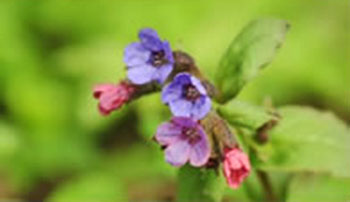
However, this natural remedy doesn't
just look the part. As early as the 1600s, lungwort has been
used to promote lung and respiratory health and clear
congestion. Pulmonaria selections come in all kinds so seek an
herbologist for direction.
Lungwort also contains compounds
that are powerfully effective against harmful organisms that
affect respiratory health, especially those related to acid
reflux.
4) CHRONIC,
TICKLY COUGH
Tickly coughs are closely related to dry coughs and are sometimes
these terms are used interchangeably.
Both these types of coughs may be
referred to as dry tickly coughs. Although this cough is
non-productive and doesn't produce phlegm, you feel as if mucus or
catarrh is dripping down the back of your throat.
Sometimes it can also feel as if there's
a lump in the throat.
CAUSE
This is known as a post-nasal drip - the
cause of about 7 percent of coughs, says Professor Peter Barnes,
head of respiratory medicine at Imperial College, London.
But they may also be caused by colds and
flu. If our immune system is not able to overcome this infection,
viruses enter the tissues of the upper airways, causing
inflammation.
Normally, we produce up to four pints of clear thin mucus every day
from the glands which line the nose and sinuses. This usually drips
unnoticed down your throat.
Tickly coughs can be triggered by pollution, a smoky atmosphere or
cold air. This is because the particles in the air you breathe are
trapped by the mucous lining of your throat, causing irritation and
the need to cough.
Hayfever can also cause tickly coughs.
The body reacts to the presence of
pollen by releasing large amounts of the chemical histamine. This
causes inflammation of the respiratory tracts, potentially leading
to a tickly cough.
Counteracting Herbs
MULLEIN
Both the flowers and the leaves of the mullein plant are used to
make an herbal extract that helps strengthen the lungs.
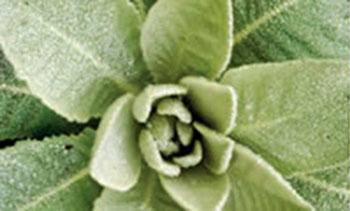
Mullein is used by herbal
practitioners to cleanse the bronchial tubes, and reduce
inflammation that is present in the respiratory tract. A tea can
be made from one teaspoon of the dried herb to one cup of boiled
water.
Alternatively, you can take a
tincture form of this herb.
PINE SHOOTS
Great for coughs, as a steam (to be inhaled), or applied, hot to
the chest.
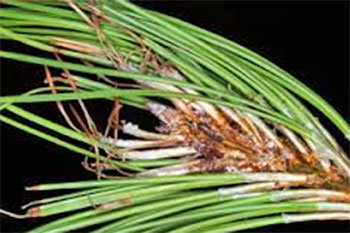
Young pine shoots, picked in spring
when the needles are still green and soft, have been used for
many decades as a traditional remedy for dry, tickly or
irritating coughs.
SPRUCE
Previous generations used in
respiratory diseases spruce resin, branches and shoots for
inhalations.
Today it is probably easier for this
purpose purchase essential oils, which can be applied either to
the aromatic lamps, or the classical pathway - for inhalation of
hot water.
Sources
|









